Let me open by commenting that sunscreen works very effectively. It started out overcast but looked like it was going to get sunny (and the UV gets you even if it’s overcast), so I put on plenty of sunscreen. But I apparently missed the sides of my kneecaps, a pretty obscure spot. I know this because they’re now bright red and painful. (Also, a very small area along my hairline.) The rest of me looks as if it stayed indoors for the day.
This burned-sides-of-the-kneecaps thing is even more awkward-looking than my Washington sunburn, when I spent a couple hours on the top of an open-top tour bus without sunscreen, foolishly thinking that I’d be fine. Unfortunately, the left side of my face got pretty badly burned (except for the spot where my sunglasses where), whereas the right side got almost no sun. So I walked around for a few days with half of my face a totally different color. My best attempts to burn the other side to not look so ridiculous really didn’t go that well, although after a few days the burn faded and I started to look semi-normal.
Before the parade started, the Spartans’ bus went by…

This (the photo of horrible exhaust, not the difficulty breathing and absolute murder on the environment) reminds me of another thing I came to realize today… This was the first time I’d had an SLR at the parade. One observation was that using the nice long zoom lens, the depth of field was a lot less than the infinite depth of field I had on my old point-and-shoot, which resulted in a pleasing background blur in many photos. (Not the bus one, so much.)
But the other thing I noticed was that it makes it way too easy to take a lot of pictures. Taking a picture takes about as long as the mirror is up, which is to say, a fraction of a second. There’s no second-long shutter lag, and no five-second pause as it writes to disk. Point and shoot. (Boy, that’s ironic.) Hold the shutter down and it just starts taking them rapid-fire.
So in the car on the way back, I realized I took almost 600 pictures during the parade. Many were garbage and will get deleted. But more than 500 pictures. Doing some quick math, CVS has ISO 200 film, 24 exposures, for $2.99. That means I’d have needed 22 rolls of film, or $65.78 worth of film. (But if I were buying film, I’d probably opt for the Kodak-brand, which is $4.79 a roll, meaning I’d have consumed $105.38.) In any case, that’s before printing, which would probably double the cost or so. Suffice it to say that if I were shooting film, I probably wouldn’t be taking four pictures of the guy with a funny hat.
As always, the parade opened (well, aside from an obnoxious drink vendor and a couple police cars shooing everyone out of the road) with some veteran color guards:
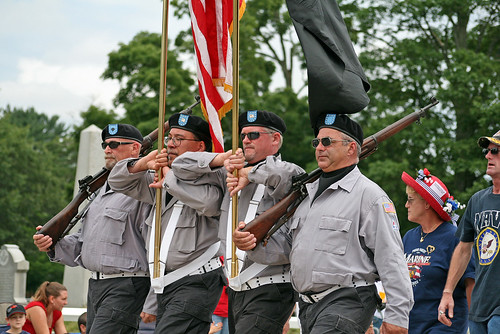
They received a (much deserved) round of applause, as did the police color guards behind them:
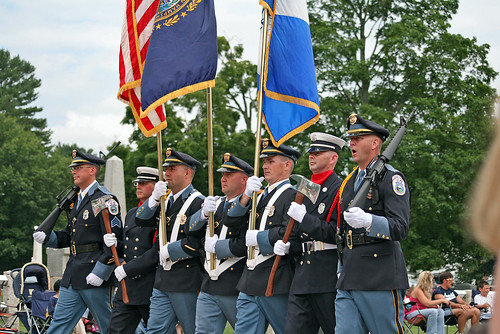
(Actually, it appears the Fire Department may have been in it, too.) As an aside, I still find color guard to be a strange term, if only because it’s meant pretty literally. The Wikipedia page has more information than you’d ever want to know, some of which definitely doesn’t meet the eye: the flag is on the right as a sign of respect; I’d have put it in the center if I were in charge, intending it to receive the most attention and respect there. I’d have also never considered the implications of turning around and whether that would render the flag out of place. Perhaps that is why I was never selected to lead the Color Guard. That and, you know, the fact that I’m not in any organization with one.
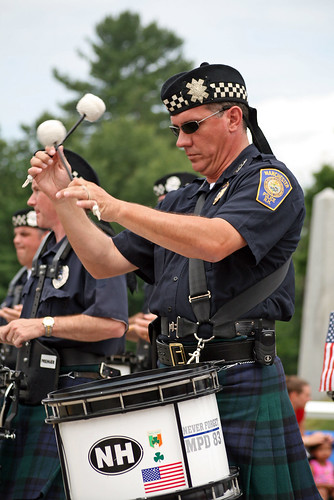
The police assocation had a “Pipes and Drums” group there as well. This photo doesn’t do this guy justice: he was actively playing the drum and twirling the drumsticks. If I’d tried twirling the drumsticks, even without playing the drum, they’d most likely have gone flying into the crowd. The fact that he did that while playing the drums was pretty impressive.

There were plenty of clowns.

The Shriners were also there. This parade proved a good learning experience, as I just looked the Shriners up on Wikipedia, too. I was familiar with their children’s hospital (actually a set of 22, one of which is in Boston), but I didn’t know that they were properly called the Ancient Arabic Order of the Nobles of the Mystic Shrine, nor that they were Masons at all. (I’m still not entirely clear on what Masons are, but that’s a project for another day.)
Although I’m very respectful of the selfless services they provide, I’ve always found their mini-cars slightly annoying, just because they’re loud and fast, and, frankly, they seem to terrify a decent number of children. As you can see, this year they upped the ante and sprayed me in the face with a water gun, too. (Okay, they didn’t spray me in the face, but the point remains…)
This year seemed to have a little less of the “random SUV with a bow on it” crap, which I always thought was pretty pathetic: a parade is a great place to showcase all of the organizations that make our town great, not a place for random people to glue crap to their car and not even represent any group. This year, all we saw were a couple antique cars and this fabulous car:

A pure white car with a fresh coat of wax in direct sunlight, incidentally, is not easy to photograph. The people in it didn’t throw candy, display a flag, or even wave. But still, nice car.

This was a student driver vehicle (I didn’t pay attention to the driver, though I’d hope it was an adult: there seemed to be about 200 opportunities for collisions). I’ve also resented the random company presences, but these people did it well, with plenty of flags and celebrity appearances. The Obama mask does seem a bit of a caricature, but at least it wasn’t overtly racist.

I’m not sure what group this person was from, but that is a big bubble.
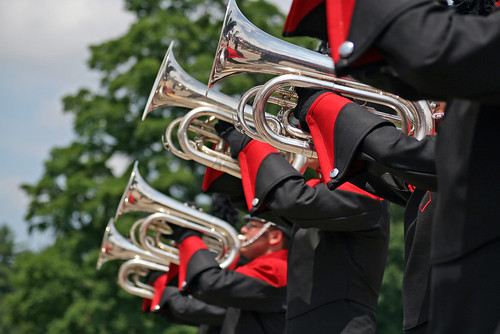
The Spartans were there too; quite an impressive show. Although as long as my post seems to be a sort of critique of the Independence Day parade…
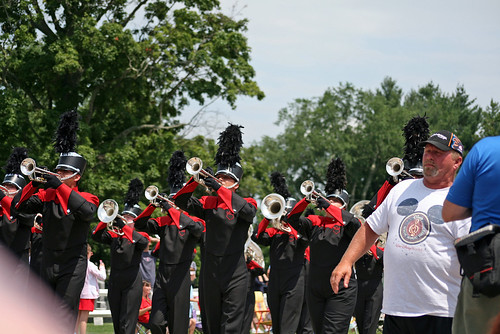
The Spartans are excellent at presenting a highly-polished appearance, with suits that are perpetually in excellent condition, incredibly well-rehearsed formations and step, and even meticulous instruments. And then there’s this random dude in a Disney T-shirt walking alongside them, who seemed to be a part of their group. Seriously? (Hope he’s not traveling!)

The MHS Cheerleaders were in attendance as well. While I’m perpetually terrified that they’re going to miss and the poor girl is going to crash into the pavement, they’re quite good at what they do. I’m loving this as a “freeze-frame” shot. (Even at ISO100, this was a 1/1,600-second shot.)

The Twizzler and Oakleys seem a bit anachronistic (I haven’t had a chance to use that word in years?).

This guy did a much better job.
As always, we had plenty of political groups on hand. We were fortunate (as we often are) to have many of them there in the flesh:

Governor Lynch is great. As he walked along waving to everyone with his characteristic happy smile, this lady came running out to him. (The plainclothes officer behind him didn’t react, which would have made things much more interesting.) Governor Lynch stopped—in the middle of the parade—to pose with her for a photo. What a sport!

I’d been invited to march in the Obama section of the parade, but decided to take it easy this 4th of July. As it got closer I was feeling a bit guilty, worrying that the turnout wouldn’t be so great. I was pleased to see that I was wrong. (That isn’t everyone, either: they continue out to the right.)

This is a strange photo, as I have no idea what is transpiring. No one had as big a crowd as did Jeanne Shaheen, former governor. She ran before in 2002, when she was narrowly defeated by a Republican, though a massive phone-jamming effort (than sent someone to jail for three months) is sometimes blamed for her narrow loss.

Mike Kaelin, running for NH State Senate. I haven’t brushed up on all of his policies yet, but he seems like a great guy, and has that, “Just an ordinary hard-working New Hampshire citizen” attribute that I really value.

Jeb Bradley, considered a moderate Republican, was swept out of office (US House of Reps) by Carol Shea-Porter in 2006. He’s running for office again, though I’m a bit uneasy about his stance on automobile safety.

John Stephen is the third-party other Republican candidate. I haven’t had a chance to review his stance on the issues yet either, but my mom (special ed teacher and lifelong advocate for special education issues) has expressed her concerns about him based on his past actions.

The Register of Deeds seems like a hotly-contested seat. It’s worth noting that the person heading it actually appears to be the Registrar of Deeds, a distinction I’d really hope those running would get.

Joe Kenney is running against Governor Lynch for governor, whose slogan seems to consist of saying, with a sense of urgency, that New Hampshire is becoming Massachusetts. The reader is left to infer meaning, though as someone born in Massachusetts, someone who recently finished four years of college in Massachusetts, and may well end up moving to Massachusetts when he gets a job, I’m not quite sure I see where he’s going. His campaign website text also fails to impress me, with things that sound more like trolls on the Internet than things I’d like to see from our governor: “John Lynch keeps trying to blame the national economy for his lack of priorities and decision-making. However, the national economy is not the problem! Rather, the problem is the over-spending and pandering to special interests.” And, “It’s very nice to go up and greet workers when they lose their jobs, but how about bringing some companies in so they can find a new job? Joe is a very kind person and was the first one on the scene when a plant in his district closed.” Don’t get me wrong, he’s a great guy, I just wouldn’t vote for him to be governor.

Lady Liberty turned her back on me!

Uncle Sam, though, kept a watchful eye on me.
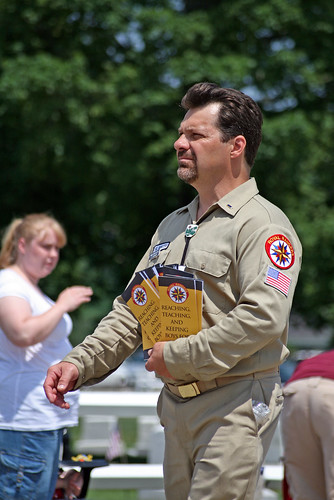
It’s been a while since I delved into a tangent about research I did on Wikipedia, so here goes: I have gone 22 years of life without ever so much as hearing the phrase, “Royal Rangers” used. And if you asked me, I’d have guessed that it was an elite form of military, perhaps equivalent to the Navy SEALs, in Britain. In actuality, it turns out that the Royal Rangers are essentially a religious organization (meant for boys) kind of like the Boy Scouts. (This photo, obviously, is of one of their leaders, not a member.)
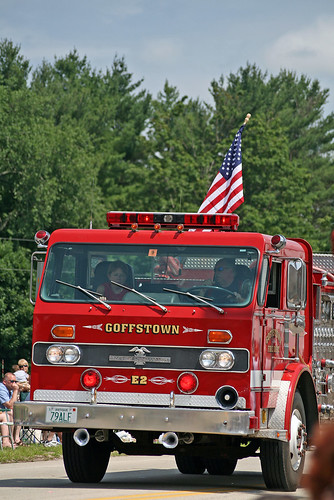
There were copious fire trucks towards the end, many from other towns. Most of all, though, I was fascinated by this banner:

The SPAAMFAA, or the [deep breath] Society for the Preservation and Appreciation of Antique Motor Fire Apparatus in America. The good news is that there’s no ambiguity about what this group stands for. The bad news is that, like a novel that starts out with some boring scene with characters that haven’t been introduced, I lost interest in reading it.
Oh, and I saved the best for last:

Team 166, Merrimack’s FIRST team (called “Chop Shop”).
Did anyone actually make it all the way to the end of this post?



























